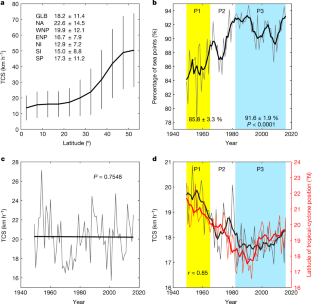Climate change and tropical cyclone trend (original) (raw)
- Matters Arising
- Published: 05 June 2019
Nature volume 570, pages E3–E5 (2019)Cite this article
- 10k Accesses
- 164 Citations
- 65 Altmetric
- Metrics details
ARISING FROM J. P. Kossin Nature https://www.nature.com/articles/s41586-018-0158-3 (2018)
Understanding the response of tropical cyclones to a changing climate has become a topic of great interest and research. Kossin1 showed that tropical-cyclone translation speed (TCS) has decreased globally by 10% over the period 1949–2016 and stated that this is consistent with the expected changes in atmospheric circulation forced by anthropogenic warming. However, we question the robustness of his conclusions1 for the following reasons: (1) TCSs generally increase with the latitude of the tropical cyclones and are therefore very sensitive to the bias of tropical-cyclone detection with respect to latitude; and (2) in the pre-satellite era (1949–1965), there is a high possibility that systematic biases in the detection of tropical cyclones exist in the best-track data, which could produce spurious trends in TCS. Therefore, the slowdown of TCS stated1 may not be a real climate signal or it may be exaggerated.
This is a preview of subscription content, access via your institution
Access options
Access Nature and 54 other Nature Portfolio journals
Get Nature+, our best-value online-access subscription
$32.99 / 30 days
cancel any time
Subscribe to this journal
Receive 51 print issues and online access
$199.00 per year
only $3.90 per issue
Buy this article
- Purchase on SpringerLink
- Instant access to full article PDF
Prices may be subject to local taxes which are calculated during checkout
Additional access options:
Fig. 1: Changes in mean TCS according to latitude, basin and time along with their mean latitudes and percentages at sea points.

Data availability
The tropical cyclone data were taken from the International Best Track Archive for Climate Stewardship (IBTrACS; https://www.ncdc.noaa.gov/ibtracs).
Code availability
All codes used to analyse and plot the data are available from the corresponding author on request.
References
- Kossin, J. P. A global slowdown of tropical-cyclone translation speed. Nature 558, 104–107 (2018); Author Correction Nature 564, E11–E16 (2018).
Article CAS ADS Google Scholar - Landsea, C. W., Harper, B. A., Hoarau, K. & Knaff, J. A. Can we detect trends in extreme tropical cyclones? Science 313, 452–454 (2006).
Article CAS Google Scholar - Chu, J. H., Sampson, C. R., Levine, A. S. & Fukada, E. The Joint Typhoon Warning Center Tropical Cyclone Best-tracks, 1945–2000. Report NRL/MR/7540-02-16 (Joint Typhoon Warning Center, Hawaii, 2002).
Google Scholar - Kossin, J. P., Olander, T. L. & Knapp, K. R. Trend analysis with a new global record of tropical cyclone intensity. J. Clim. 26, 9960–9976 (2013).
Article ADS Google Scholar - Landsea, C. W., Vecchi, G. A., Bengtsson, L. & Knutson, T. R. Impact of duration thresholds on Atlantic tropical cyclone counts. J. Clim. 23, 2508–2519 (2010).
Article ADS Google Scholar - Kang, N.-Y. & Elsner, J. B. Consensus on climate trends in Western North Pacific tropical cyclones. J. Clim. 25, 7564–7573 (2012).
Article ADS Google Scholar - Landsea, C. W. Counting Atlantic tropical cyclones back to 1900. Eos 88, 197–208 (2007).
Article ADS Google Scholar - Truchelut, R., Hart, R. E. & Luthman, B. Global identification of previously undetected pre-satellite era tropical cyclone candidates in NOAA/CIRES twentieth-century reanalysis data. J. Appl. Meteorol. Climatol. 52, 2243–2259 (2013).
Article ADS Google Scholar - Torn, R. D. & Snyder, C. Uncertainty of tropical cyclone best-track information. Weather Forecast. 27, 715–729 (2012).
Article ADS Google Scholar - Hodges, K., Vobb, A. & Vidale, P. L. How well are tropical cyclones represented in reanalysis datasets? J. Clim. 30, 5243–5264 (2017).
Article ADS Google Scholar - Kossin, J. P., Emanuel, K. A. & Vecchi, G. A. Past and projected change sin western North Pacific tropical cyclone exposure. J. Clim. 29, 5725–5739 (2016).
Article ADS Google Scholar - Neumann, C. J., Jarvinen, B. R., McAdie, C. J. & Hammer, G. R. Tropical Cyclones of the North Atlantic Ocean, 1871–1998. (Historical Climatology Series 6-2, National Climatic Data Center, 1999).
Acknowledgements
This research was supported by the Basic Science Research Program through the National Research Foundation of Korea (NRF) funded by the Ministry of Education (2017R1A2B2005019) and the Korea Meteorological Administration Research and Development Program under grant KMI2018-07610.
Author information
Authors and Affiliations
- Typhoon Research Center, Jeju National University, Jeju, South Korea
Il-Ju Moon & Sung-Hun Kim - Guy Carpenter Asia-Pacific Climate Impact Centre, School of Energy and Environment, City University of Hong Kong, Kowloon Tong, Hong Kong, China
Johnny C. L. Chan
Authors
- Il-Ju Moon
- Sung-Hun Kim
- Johnny C. L. Chan
Contributions
I.-J.M. conceived the idea, designed the study, and wrote the Comment. S.-H.K. conducted most of the analysis and discovered the main results. J.C.L.C. contributed to the interpretation of the results and editing of the manuscript.
Corresponding authors
Correspondence toIl-Ju Moon or Sung-Hun Kim.
Ethics declarations
Competing interests
The authors declare no competing interests.
Additional information
Publisher’s note: Springer Nature remains neutral with regard to jurisdictional claims in published maps and institutional affiliations.
Rights and permissions
About this article
Cite this article
Moon, IJ., Kim, SH. & Chan, J.C.L. Climate change and tropical cyclone trend.Nature 570, E3–E5 (2019). https://doi.org/10.1038/s41586-019-1222-3
- Received: 12 August 2018
- Accepted: 19 March 2019
- Published: 05 June 2019
- Issue Date: 06 June 2019
- DOI: https://doi.org/10.1038/s41586-019-1222-3